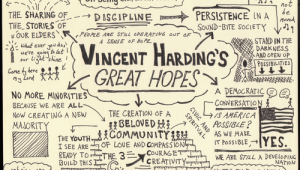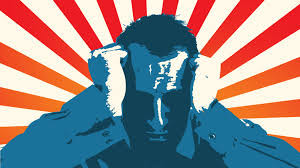Is America Possible?
November 12, 2016Vincent Harding – – Is America Possible?
In an unsettled political moment, at the end of a divisive campaign, the late, great civil rights elder Vincent Harding is a voice of calm, wisdom, and perspective. He was wise about how the civil rights vision might speak to 21st-century realities. Just as importantly, he pursued this by way of patient yet passionate cross-cultural, cross-generational relationship. He reminded us that the Civil Rights Movement was spiritually as well as politically vigorous; it aspired to a “beloved community,” not merely a tolerant integrated society. He posed and lived a question that is freshly in our midst: Is America possible?
onbeing.org/
Vincent Harding was chairperson of the Veterans of Hope Project at Iliff School of Theology in Denver, where he was professor of Religion and Transformation. His published works include Hope and History: Why We Must Share the Story of the Movement, There Is a River: The Black Struggle for Freedom in America, Martin Luther King: The Inconvenient Hero, and the essay “Is America Possible?”
Transcript:
http://www.onbeing.org/program/vincent-harding-is-america-possible/transcript/9037#main_content
Post Election 2016
“As did many of you, I watched Tuesday night’s returns with a mix of horror and fear. Fear for our warming planet, for our sense of decency, for our future. Those feelings are real and justified, so we should all take the moments we need to understand what has just happened. And then? There is much to be done.
Here are 10 things I will do to ready myself for what lies ahead. You may find them helpful, too.”
1. Ground yourself
Breathe deeply. Go to a favorite spot in nature and really be there. Meditate. Find a favorite poem, reading, religious passage that has helped you before and read it quietly.
2. Allow the grief
Don’t suppress your feelings of fear, dread, anger, grief. Just allow them. But don’t wallow there; move on when you’re ready.
And allow other feelings to arise, too—they may surprise you.
3. Be with friends
This is a time for community. Share your feelings, your insights, your fears—and, especially, your hopes. Hug a lot.
4. Take a media break
Keep up with the news, but turn off the endless rehashing of painful stuff that you already know.
5. Take care of the children
Yours, neighbors’, grandchildren. They will sense your fear, and the very young won’t understand it. Reassure them that they are safe.
6. Reach out to anyone threatened
There are people who are especially afraid: immigrants, Muslims, Blacks, Latinos. Speak up and show solidarity.
7. Don’t dismiss the Trump voters
Remember that many of his supporters voted from a place of anger and despair about many of the same things for which you feel anger and despair: all the wealth going to the already wealthy, corporations getting all the breaks while everyone else feels stiffed, political power wielded by the very rich.
8. Think local
I’ll bet on Tuesday night there was something (maybe many things) on your local ballot to celebrate. Embrace them. And find the many ways in addition to electoral politics to make change in your community, your town, your state.
9. Take care of yourself
Yes, eat some comfort food—but then take those walks, do those yoga stretches. The whole world needs your energy, your health, your vision. There is much to be done.
10. Take the long view
Martin Luther King’s words can hold us: “The long arc of history bends toward justice.”
‘The work of a lifetime; it’s worth it.’
Hang in there
“Is there anything more difficult?
Showing up day after day, week after week, sometimes for years, as your movement slowly gains steam, as your organization hits speed bumps, as the news goes from bad to worse…
Showing up, it turns out, is the hardest part of making a difference.
Make a list of the organizations and voices and movements that have made a difference. How old are they? How long have they been at it?
Creating impact, building something of substance, changing the culture… this is the work of a lifetime, not merely a fun project.
It’s not easy, but I have a feeling you’re up for it. Because it matters.”
-Seth Godin
❥





